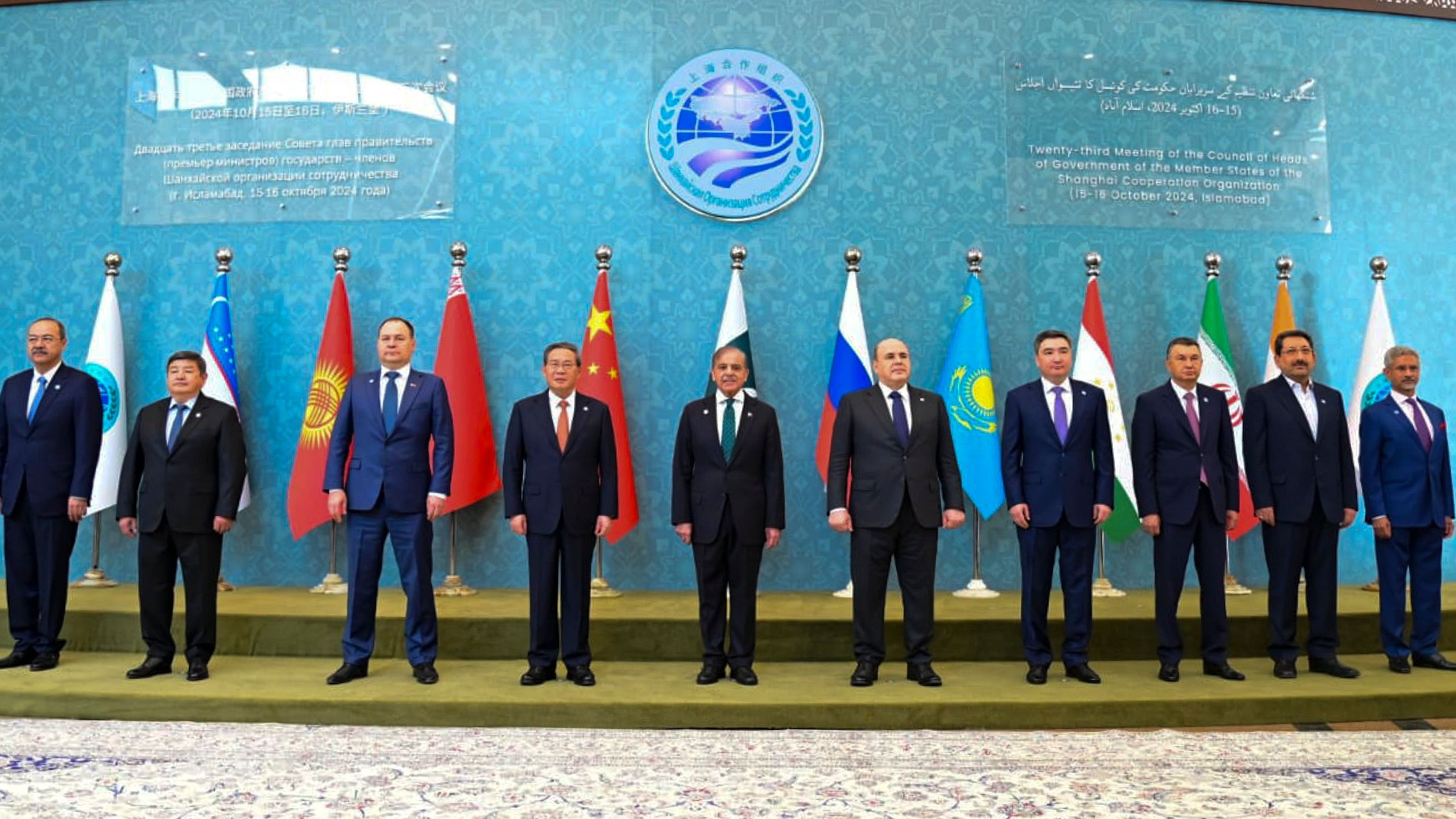
External Affairs Minister S Jaishankar with Pakistan Prime Minister Shehbaz Sharif and other leaders during the 23rd meeting of the SCO Council of Heads of Government, in Islamabad, Pakistan.
Credit: PTI Photo
New Delhi: Even as China and Pakistan on Wednesday used a meeting of the Shanghai Cooperation Organisation (SCO) to promote President Xi Jinping’s Belt and Road Initiative, India subtly criticised both its neighbours, stressing that the sovereignty and territorial integrity of all nations must be respected while pursuing regional connectivity initiatives.
The 23rd meeting of the SCO Council of Heads of Governments in Islamabad also saw India tacitly hitting out at Pakistan for cross-border terrorism. Pakistan also referred to the ‘misuse’ of the territory of Afghanistan for terrorist attacks against the neighbouring countries, albeit avoiding directly reiterating its allegations against India.
India refrained from endorsing the SCO joint communique’s paragraph on the Belt and Road Initiative, unlike China, Pakistan, and seven other members of the bloc. Pakistan, on the other hand, indirectly countered India’s position on China’s BRI, arguing that Xi Jinping’s ambitious cross-continental development and connectivity initiative should not be seen through “a narrow political prism”.
“Globalisation and rebalancing are realities that cannot be denied. Cumulatively, they have created many new opportunities in terms of trade, investment, connectivity, energy flows, and other forms of collaboration,” External Affairs Minister S Jaishankar said presenting India’s national statement at the SCO conclave that was hosted by Pakistan Prime Minister Shehbaz Sharif. “There is no question that our region would benefit immensely if we take this forward. Not just that, others too would draw their own inspiration and lessons from such efforts.”
“However, Excellencies, to do that, cooperation must be based on mutual respect and sovereign equality. It should recognize territorial integrity and sovereignty,” added Jaishankar. “It must be built on genuine partnerships, not unilateral agendas. It cannot progress if we cherry-pick global practices, especially of trade and transit.”
New Delhi has been opposed to BRI ever since it was launched by China in 2013. Beijing in the past 11 years got over 150 nations to sign agreements for the implementation of infrastructure projects, like the construction of highways, railways, and power plants, all to be executed by the state-owned companies of China.
The $1 trillion BRI, however, has over the past few years turned controversial as China’s predatory lending practices put many small least developed, and developing nations in South Asia, Southeast Asia, and Africa, into debt traps.
New Delhi has been particularly critical of the China-Pakistan Economic Corridor (CPEC), which it says violated the sovereignty and the territorial integrity of India. The 3000-km-long CPEC, a flagship component of the BRI, linked China’s Xinjiang Autonomous Region and the port city of Gwadar in southern Pakistan. It covered the areas claimed by India as its own but illegally occupied by Pakistan. China pledged to invest $ 65 billion in infrastructure projects along the CPEC, including the territories of India occupied by Pakistan.
Jaishankar's comment on the need for connectivity initiatives to respect the sovereignty of all nations came a day after Shehbaz Sharif and Chinese Premier Li Qiang had a bilateral meeting in Islamabad.
The two leaders agreed to add momentum to the CPEC and witnessed the signing of several deals, with China promising new investments in cash-strapped Pakistan.
“Let us not look at such projects through the narrow political prism and invest in our collective connectivity capacity which is crucial in advancing the shared vision of an economically integrated region,” Sharif, who chaired the SCO conclave in Islamabad on Wednesday, said, referring to the CPEC in particular and the BRI in general. With Li among the leaders attending the meeting of the 10-nation bloc, Sharif called for expanding the BRI.
Jaishankar, who represented Prime Minister Narendra Modi at the conclave, also raised the issue of terrorism. “If activities across borders are characterized by terrorism, extremism, and separatism, they are hardly likely to encourage trade, energy flows, connectivity, and people-to-people exchanges in parallel,” the external affairs minister said at the SCO meet. “If the friendship has fallen short and good neighbourliness is missing somewhere, there are surely reasons to introspect and causes to address.”
The terror attacks on professionals from China in Pakistan – including the ones working on the CPEC projects – claimed several lives over the past few years. Islamabad often tried to lay the blame on New Delhi, accusing India of orchestrating the attacks using terrorists based in Afghanistan. Sharif on Wednesday avoided reiterating Pakistan’s allegations against India but said that misuse of Afghanistan’s territory for terror attacks in its neighbouring countries must be stopped. His comment came a day after Islamabad promised Beijing to “find out the whole truth” about the attacks on China’s personnel in Pakistan.
Pakistan avoided directly hitting out at India on the issue of Jammu and Kashmir at the SCO meet on Wednesday. The joint statement issued by Pakistan and China after the Sharif-Li meeting on Tuesday, however, reiterated the position of the two nations on the issue.
